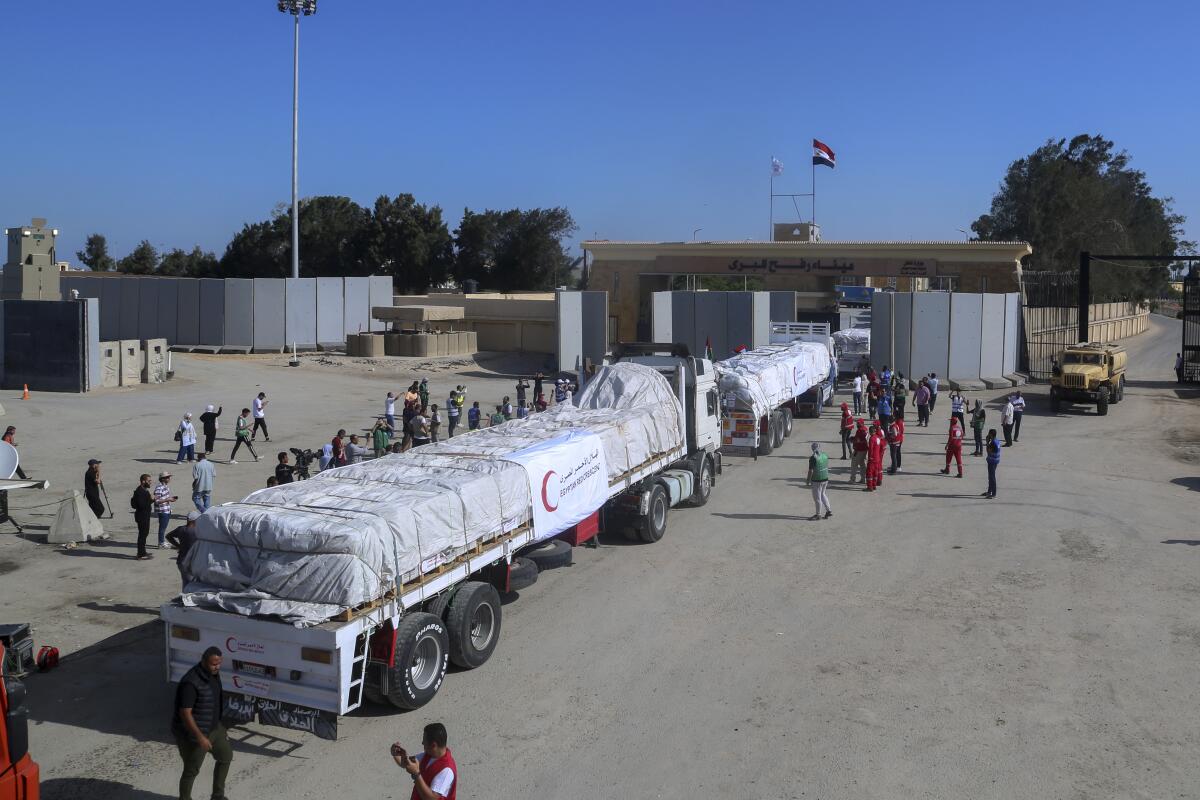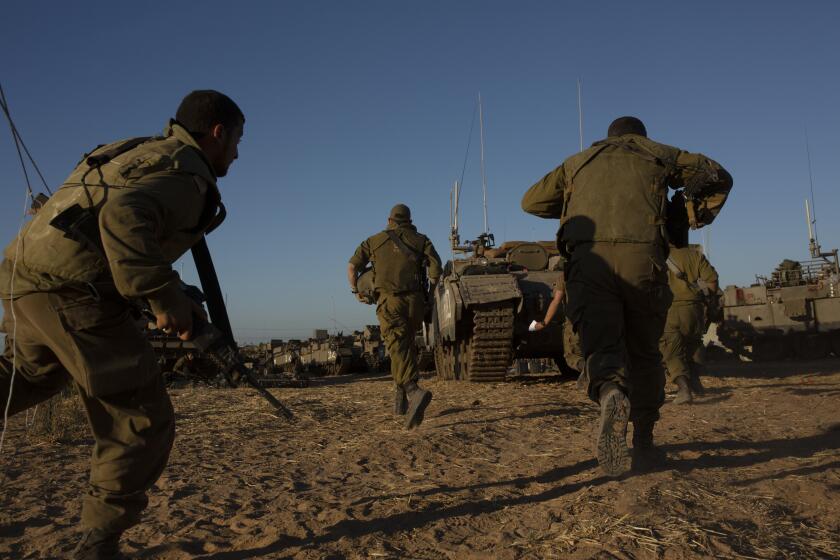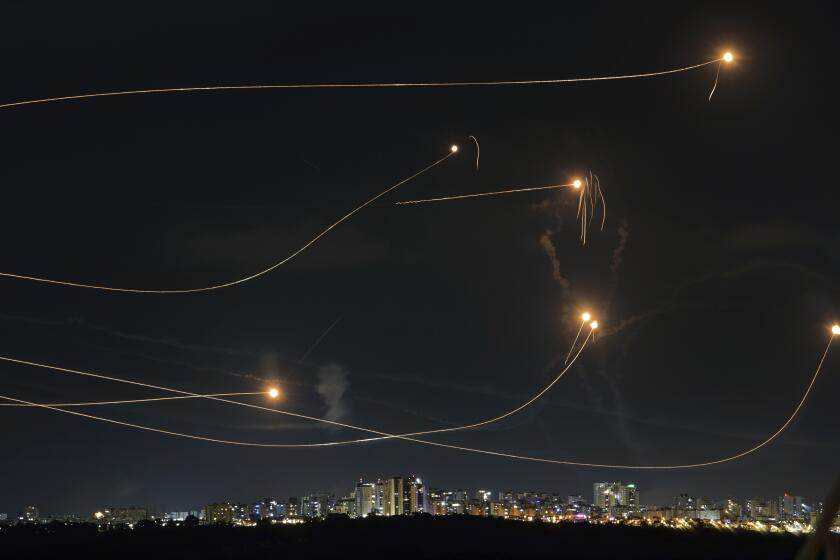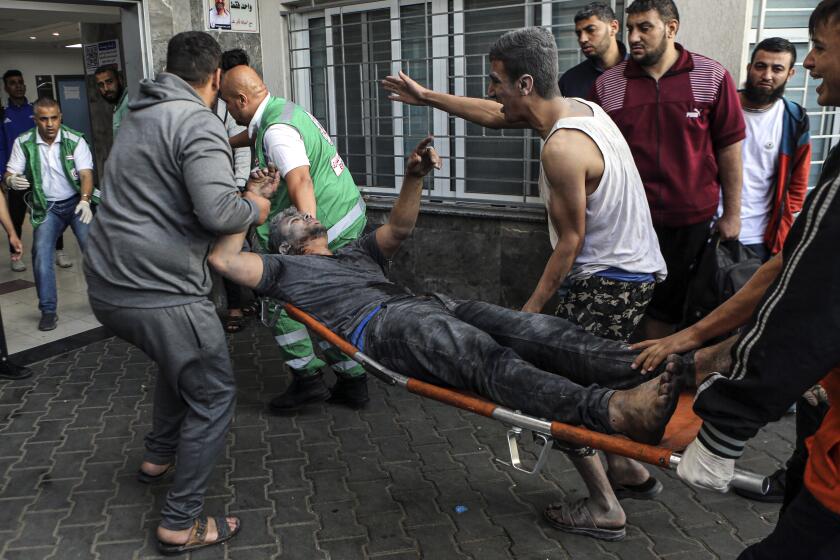Why isn’t more humanitarian aid reaching Gazans?

- Share via
Last weekend, humanitarian relief supplies finally started trickling into Gaza as Israel’s aerial bombardment intensified. The combined total of 34 trucks bringing desperately needed food, water and medical supplies amounted to just 3% of Gazans’ previous meager average daily commodities imports.
Distribution remains patchy, with some hospitals reporting having received body bags and medical equipment, others not yet. The main U.N. relief organization in Gaza said on Tuesday that it would have to cease operations on Wednesday if it did not receive fuel.
The delivery of humanitarian aid during war is always fraught. Swimming against the tide of war can prove frustrating and even futile; hard-fought gains can be swept away by a single errant bomb. Ongoing hostilities can make logistics of delivery nightmarish, especially in places like Gaza’s northern “evacuation zone.”
The Hamas attack represented a spectacular failure of Israel’s ‘mowing the grass’ strategy in the Gaza Strip. Only better conditions can break the cycle.
One of the most common humanitarian quandaries, however, is a kind of moral hazard. It involves making concessions to unsavory local governments in order to get aid to the people in need.
This is not specific to Gaza, where Israel is understandably concerned that aid could support Hamas’s continuing attacks. Humanitarians often have to work with distasteful governments, “nonstate armed actors” and warlords to gain access to the people in greatest need. The terms set by such actors will naturally benefit them in some way.
The U.S. must stand firmly behind Israel but caution our ally against overreacting against Gaza’s civilians to the grotesque Oct. 7 Hamas attack.
Moral hazard questions gave rise to the modern humanitarian landscape. When Biafra declared its independence from the rest of Nigeria in 1967, Nigeria imposed a military blockade and starvation campaign. An estimated 1 million to 3 million people died between 1967 and 1970 as a result.
Doctors and supplies were dispatched to the conflict by the International Committee of the Red Cross. It and other groups organized an airlift into the territory, paying “landing fees” charged by Biafran authorities — fees that were then used to fund the war.
What happened when the United States invaded Afghanistan to demolish the Taliban foreshadows what could happen in Gaza.
Some doctors felt frustrated by the aid organizations’ injunction against speaking out against this corruption. Some believed that their very presence might ultimately be doing more harm than good. Ultimately, they quit the Red Cross to found the more activist Doctors Without Borders in 1971.
Since then, the Hippocratic oath to “do no harm” has been incorporated into the humanitarian lexicon. But recent revelations about aid embezzlement fueling further conflict abound — from the Democratic Republic of Congo to Ethiopia to Yemen.
Both Israelis and Palestinians have alternately been victim and aggressor in this conflict. It’s easy to pass judgment from the outside on choices that now seem impossible to reverse.
In Gaza, numerous instances of aid diversion have been reported over the 16 years that Hamas has run the government. Hamas agents have dismantled EU-provided water pipes for rocket fuselages, and they have stolen food and fuel from the United Nations Relief and Works Agency.
Hamas has also benefited from aid less directly. The relief agency, funded on a voluntary basis by other countries, including the U.S., has delivered education and healthcare services via 284 schools and 22 hospitals. It thereby lessens the discontent of the Gazan population and allows Hamas to channel scarce resources into missiles instead of medicines.
Here in the U.S., Republicans such as Sen. Rick Scott (Fla.) seem to think the answer to the risk of aid diversion in Gaza is not to give it at all. Their party has taken that view on numerous occasions. In 1987, President Reagan’s GOP passed the Anti-Terrorism Act aimed at cutting off aid to the Palestinian Liberation Organization. In 2003, Sen. Mitch McConnell opposed President Bush’s proposed $20-million aid package to the PLO, warning that Hamas might benefit. In 2006, most U.S. foreign aid to Palestinians was cut in response to Hamas’ election victory. And in 2018, President Trump signed the Anti-Terrorism Classification Act and slashed aid to the Palestinian territories citing in part textbooks adopted by Hamas (but funded by the United Nations Relief and Works Agency) that some said glorified jihad. Another instance of aid organizations having to make nice to gain access.
On the other hand, the foreign aid largely channeled through that agency has been a lifeline in a territory forced to endure brutal economic isolation. The upsides to the interventions have been enormous: more than 500,000 students enrolled in any given year, 1.9 million Palestinians provided with healthcare services, not to mention the 22,000 local UNRWA jobs that do all that and more. And now, the agency has become an important provider of humanitarian assistance during this conflict.
Despite the long-established U.N. presence in Gaza, the U.S. effectively needs Israeli permission to deliver aid there. President Biden’s proposed $10-billion aid package for Israel outstrips the humanitarian aid package he is offering to Gaza by 100 times, sweetening an otherwise bitter proposition. (And yet Israel is a developed country with a per capita GDP roughly 14 times higher than among Palestinians; the U.S.’ proposed military aid would represent only around 30% of the Israel Defense Force’s budget for 2023.)
We don’t know the terms of the deal Biden struck with the Israelis to allow some aid to flow, but we do know that the trickle has begun. We also know that the suffering of the people of Gaza far eclipses the aid headed their way. The U.S. will continue to play a role, and it can ensure future terms with Israel include more and more concessions to help civilians in the war zone.
Topher McDougal is a professor of economic development at the Joan B. Kroc School of Peace Studies at the University of San Diego.
More to Read
A cure for the common opinion
Get thought-provoking perspectives with our weekly newsletter.
You may occasionally receive promotional content from the Los Angeles Times.










